Raw
Breaking Out In Showtime's Most-Watched SeriesYellowjackets, Now In Season Two, And Starring In Upcoming Stephen King film, The Boogeyman, Multi-talented Rising Star Sophie Thatcher Lays Out Her Talent With Wild Abandon
PHOTOS BY KAT IRLIN
WORDS BY TAMARA RAPPA
Listen to the extended podcast interview ---find Story + Rain Talks and Sophie's episode 128 ---on Apple Podcasts, Spotify and more.
Tamara Rappa: You've always been intent on being a storyteller, not only as an actor. What do you think had an early influence on you, to create that desire?
Sophie Thatcher: I think it came from maybe some kind of discomfort within my own life and wanting to live in a fantasy world. Not to go too dark or anything, but from a genuine dislike of and discomfort in myself kind of early on. I had an okay childhood, but I think I was just trying to reach beyond, and find something so different. Being so glued to the computer; being obsessed with film...it was me trying to find some kind of escape, wanting to live in a different world.
TR: You've said that you want to tell stories that make people feel less alone.
ST: For me, the most powerful thing I can feel from art or music, is when it can center me, when I can see myself in an artist or the music; find some point of connection. There's loneliness in everyone, but I think growing up, I felt that especially. [Musician] Elliott Smith is the best at it. He's very open about his personal experience. It's not that I have to be 'open', but if I can share my vulnerability, and people can connect to it, and see themselves in different characters I play, I feel like it will help them accept themselves, and feel less alone. It's a lot to talk about. Pieces of music and pieces of art....can really push you forward, and make you feel less of that impending sense of doom.
"I think there was an openness to [the 90s] era, and it also it seems to have felt a little bit more relaxed, less self aware. Today, we are very self aware, to the extent that it can be dangerous."
TR: What have you watched in your own life specifically that has done that for you?
ST: I was re-watching, I Know This Much Is True, by [Director] Derek Cianfrance. It's really depressing, it's about these twins, and Mark Ruffalo is just fantastic. The music is fantastic. The music is almost my favorite part. Harold Budd, I think it was the last thing that he did, he does a beautiful score, and a lot of ambient pieces for it. I loved it. I just watched it, and it stayed with me for a couple weeks. Then I re-watched it again, and it's still stuck with me. If I can have any kind of impact like that with the roles that I play... It made me feel fucking amazing. It made me realize that I'm kind of going on the right path. I was at a bar in the East Village, and this woman came up to me and was like, 'You're in Yellowjackets?' And she showed me her rings. They were all the rings that my character wears, and she said to me, 'You are me. I'm seeing myself on TV, and I've never seen myself on TV before.' It's just fucking insane. It was a little intense. It was a little scary too, because there's some kind of, I don't know...there's power in it. For me, it was kind of the ultimate validation. If I can make people feel seen again, if I can help people in that 'other' box feel seen, then I'm on the right path.
TR: Your twin sister is an artist. Is there anyone else in your family who shares your creative soul? How were you raised, when it comes to the arts?
ST: I have so much family because my family's Mormon. I have endless cousins, and they're all in Utah, in Idaho. My great aunt died recently, and I took my boyfriend to go to Utah to see some of my distant family on my mom's side. That made me realize that everybody's strange in their own way. Everyone's very musical, that's how I grew up. That was something that was an outlet for me. I was in the church choir. My mom played piano. Everyone in my family has very specific taste, and I think it's very English, very old fashioned, and I think that comes with the religion. It was refreshing to go back to Utah even though I'm not practicing the religion anymore. Everyone is still so kind and so welcoming, and they're all freaks too. [Laughs] They're all weird. I always thought that me and [my sibling] Ellie came out of nowhere! We didn't come out of nowhere; we came from feeling like all of them, feeling out like outcasts.
"I had an okay childhood, but I think I was just trying to reach beyond, and find something so different."
 ABOVE PHOTO: Top, Isabel Marant. THIS PHOTO: Sweater, necklace, and shoes, Chanel. Skirt, Isabel Marant.
ABOVE PHOTO: Top, Isabel Marant. THIS PHOTO: Sweater, necklace, and shoes, Chanel. Skirt, Isabel Marant.
TR: What's it like for you, twin siblings, both artists?
ST: I think we really fuel each other. There's nobody else in the world that I trust more than them, and I trust their taste. We basically have the same exact taste. Whenever they make a painting, or anything, I'm like, 'Why the fuck didn't I do that?!' I wish I had more time to do that kind of thing. Everything they do, I can see perfectly in my head. Now that I'm getting back into drawing and painting, I've noticed that we're living in the same kind of fantasy. I'm very inspired by their art. The drawings that I make are very medieval, and a lot of their art is medieval-inspired. I don't know where that connection comes from; maybe because my mom and my brother are history buffs. We grew up relatively cultured. Ellie, whenever I make anything new, they're the first person I send it to. I know that they'll be honest, always. I can't imagine not having Ellie. It's hard, too, because Ellie's so exceptionally talented. Not saying that acting isn't art, but for a while I felt like acting wasn't art, which is bullshit. I felt like drawing was their thing, and I wanted to create space for a healthy relationship. Being a twin makes you naturally competitive. But they're so encouraging of me in terms of my drawing. They'll give me tips because they've been doing it longer. All those years when they mastered the skill, I was I on set and such. I'm a little late getting back into it, but it feels like the most natural thing.
TR: I love that you make time for all of these different creative outlets and endeavors.
ST: I can get lazy. I've noticed recently, it's either that I'm taking a nap because I'm so tired, or I'm drawing or making music. There's no in-between.
TR: That makes me think about how people really do kind of fall into two categories. You're either that person who unwinds at night, or who lights up with creativity.
ST: It's my time to be alone. I have hours without getting emails, without people texting me. It's my time to put my phone away, to put on a record, and start drawing for a bit. I can make music for hours. I've been pretty good with that recently. And I'm getting better with being proactive with my time---not scrolling, not doing the scrolling.[Laughs]
TR: How do you like your physical surroundings to be, when it comes to being at home? Being an actor requires that you travel all the time, so what needs to be present at your home base, wherever home base is for you?
ST: For the first time in a while, I've built myself a home, in Silver Lake, and my boyfriend just moved in officially, It''s awesome. It's so fucking nice. I'd never really realized what having a home can do to you, because sometimes you have to find home in people, in music, in a book, in these very specific things you've had throughout your life. It's nice to have an an actual, physical, safe, home. It's filled with art, with my friend's paintings, it's filled with my favorite movies. When I'm in Vancouver and when I'm staying at Airbnb's, it's about things like bringing my keyboard so I can play in my downtime. I get so antsy when I can't. Bringing my keyboard, bringing a stuffed animal...physical items.
"I was at a bar in the East Village, and this woman came up to me and was like, 'You're inYellowjackets?'And she showed me her rings. They were all the rings that my character wears, and she said to me, 'You are me. I'm seeing myself on TV, and I've never seen myself on TV before."
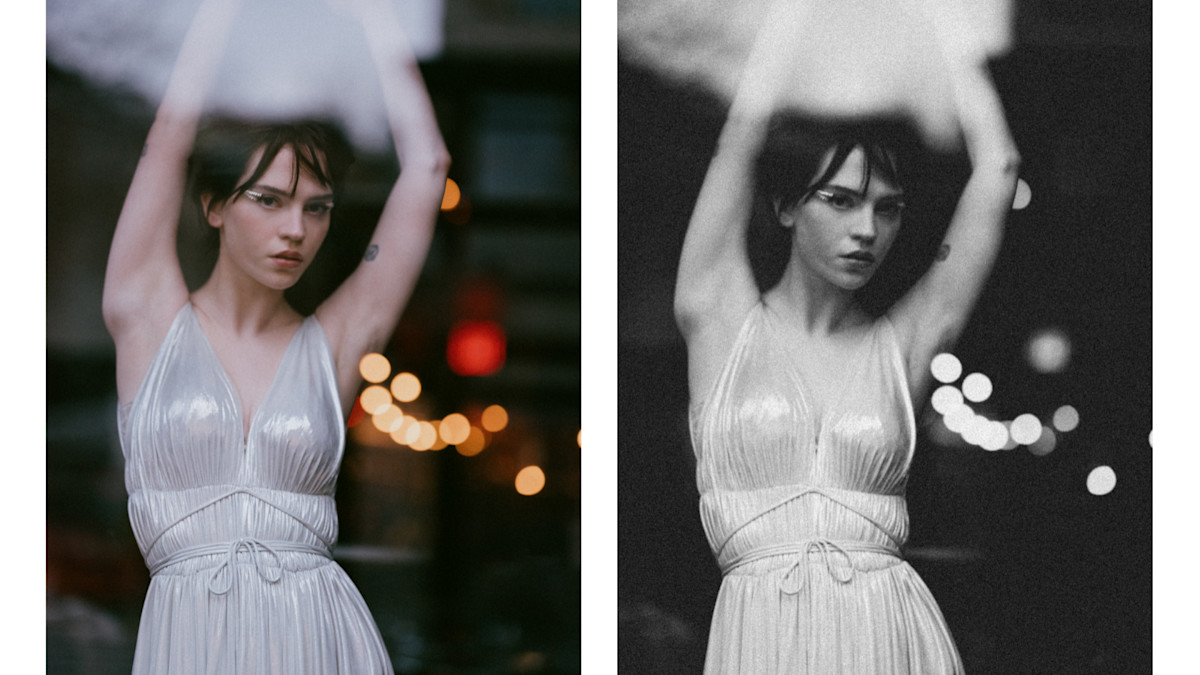
DRESS, NORMA KAMALI.
TR: You have such a strong artistic and visual sensibility. What kinds of things do you love?
ST: I love connection: I just want to feel connected. I want to be transported away from my world for a little bit. That's the power of what a really good movie can do, what a good piece of art can do. You can live in that world for a second. I want to be immersed, fully,
TR: Are there specific times when you love to consume content? Is it when you're working? Is it when you're not working? Does inspiration strike to devour content at a particular time, for you?
ST: It's interesting, when I'm working, when I was doing this last season of Yellowjackets, I could't really watch other TV shows. It makes things feel very tainted. I need to have such a one-track mind, and mentality. I'm living in this world, and I don't want outsiders to get in my head. It's also for mental health reasons, that I have to be very light with what I watch. I tend to skew towards, you know, watching something a little darker, something that makes me feel something. I was watching a lot of reality TV during the second season, for the lightness. It doesn't take anything out of you.
"Being a twin makes you naturally competitive."
TR: When you're working, you need the balance of something else.
ST: It's too technical. I have too much anxiety for the actors. I've noticed it recently, even going to plays. Live theater stresses me out so much, especially having done it myself. I always want the actor to succeed so badly, to the extent that it takes me away from the experience of live theater. LA's not the place for that, it happens whenever I go to New York...
"It's also for mental health reasons, that I have to be very light with what I watch. I tend to skew towards, you know, watching something a little darker, something that makes me feel something."
 Dress, Norma Kamali.
Dress, Norma Kamali.
TR: You're an actor, you're interested in writing, you play music, you express yourself through fashion and art. You're a creative, through-and-through. Did you find that Mormonism was in conflict with, or bumping up against your freedom and mindset as an artist?
ST: Yes and no. It was so time consuming. What took me away from the church was that I was working all the time. I was doing theater. It was kind of my way out. [The church] felt very one-sided, and it instilled a lot of anxiety in me. I'm already such a hyper-aware, anxious person, it wasn't doing me any good. The influence of my older siblings; seeing them be artistic, hearing their points of view...took me away from [the church]. As a kid, I thought, I'm never gonna have kids. I made that statement. I always said that because I thought, I'm going to be working. I was very adamant about it. Now, I don't know how I feel. It was me being stubborn as a kid, seeing all these women in my church getting married very early. It's a beautiful thing. The role of mother is such an important thing in the church, but it was something that was so far away from what I wanted, that it pushed me the other way. I think if I'd grown up without religion, without that influence, I would be a little less strange. It forced it in my head to be opposite, to go the other way entirely. If it hadn't been a part of my life, I wouldn't be exactly who I am today, I wouldn't be into what I'm doing, I wouldn't be as driven.
"I think if you're going to incorporate a musical sensibility into a movie, it has to be somewhat avant-garde, or somewhat surreal. It can't just be...breaking into song."
TR: How do you feel about working on a series or a film that will allow you to sing? Has that presented itself yet? Are you looking for projects that will allow you to do that?
ST: I have an interesting take on movie musicals. Because I was so intense as a kid, wanting to feel everything---blending dancing, singing, and acting---it was the perfect option. That's why I was drawn to musicals. It's a release of energy, and I had so much fucking energy stored inside of me. I think I've calmed down and I crave that less. But if it's done right, it can be so powerful...I'm thinking of any [Stephen] Sondheim show. I re-watched Cabaret and was bawling the entire time. I cut my hair short a while ago. Liza Minnelli is like my fucking icon. Growing up, when I was singing, I was like, I need to sound like her. I need to try to replicate my vibrato to sound like her. My number one karaoke song is Maybe It's Time. I told my boyfriend, 'This is an example of a musical that can be done so tastefully, it's avant-garde, so ahead of its time.' I think if you're going to incorporate a musical sensibility into a movie, it has to be somewhat avant-garde, or somewhat surreal.. It can't just be...breaking into song. It has to have grounding beyond that. It would have to be the right project and the right music, because I'm very specific with music.
TR: What were some of your very first impressions about acting professionally? It was in 2016 when you acted in Chicago PD.
ST: I grew up very, very competitive, knowing that whatever I was going to do, it was going to be with the best people. I had to be surrounded by people who would inspire me so I could learn from them. That's why I never really did school plays. I grew up surrounded by people who were older than me, so when I was 10, I was comparing myself to them, thinking that I needed to be on their level. It was always me trying to elevate myself. I was only 10, but I was 10 going on 40. With TV, it was a little different, a little bit more daunting. During my first TV experience, I thought I was going to have a panic attack on set. It's so normal for me now. It's crazy to think about how I used to approach it. It's flipped, now theater seems more anxiety-inducing to me than film, because I'm more used to film. When I first attacked TV, it felt like I had one shot, a couple of takes, and if I wasn't present in those moments---which I usually wasn't, because I was nervous---then I was screwed. It felt very life or death. With theater, it felt to me like you can play around. You have the time to move around and dance in the character's shoes; actually live in the shoes, rather than being too hyper-focused on being present in that one minute you have on screen.
"I think if I'd grown up without religion, without that influence, I would be a little less strange. It forced it in my head to be opposite."
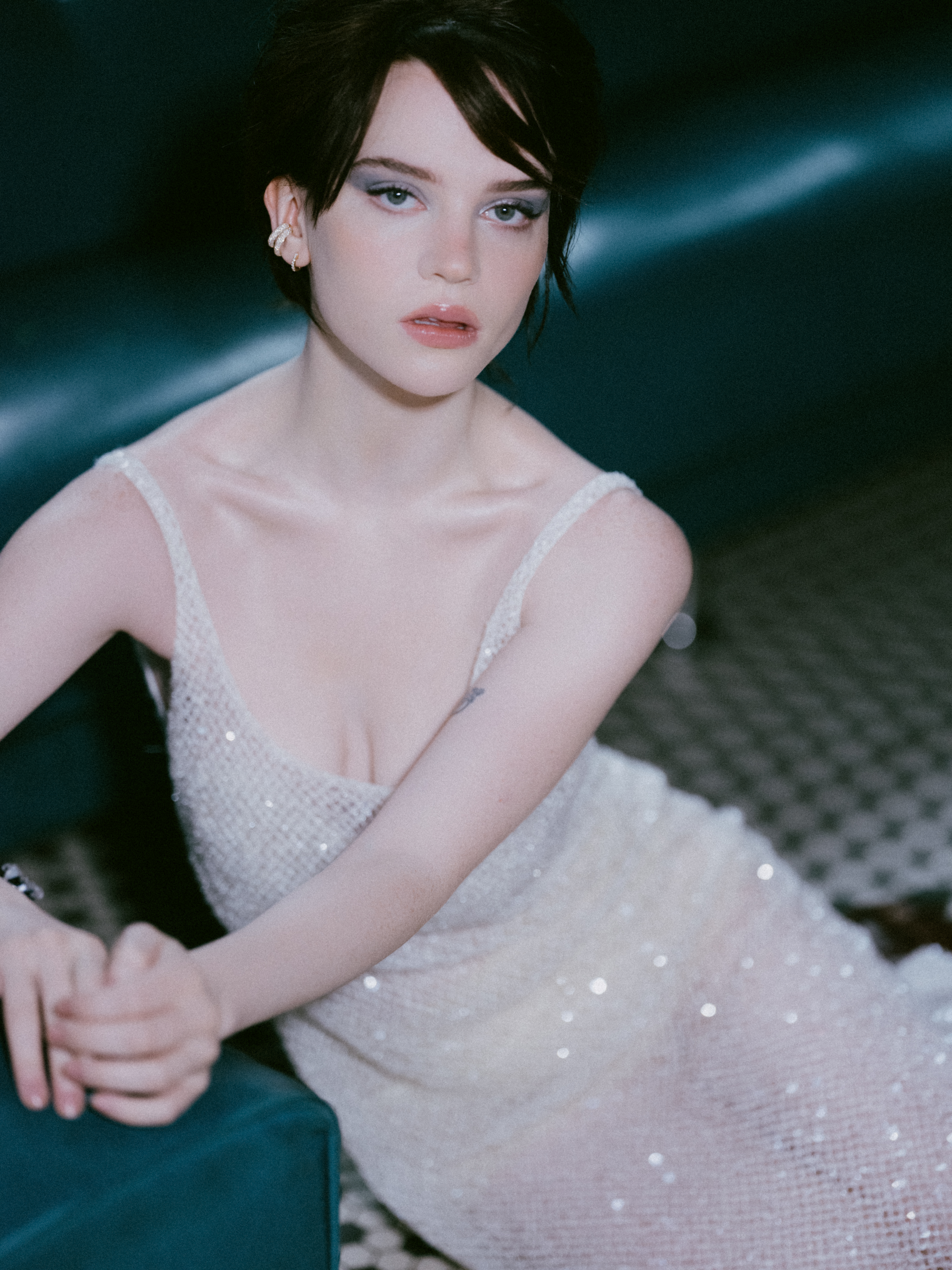 Dress, Jason Wu. EAR CUFF, ALTRUIST FINE JEWELRY.
Dress, Jason Wu. EAR CUFF, ALTRUIST FINE JEWELRY.
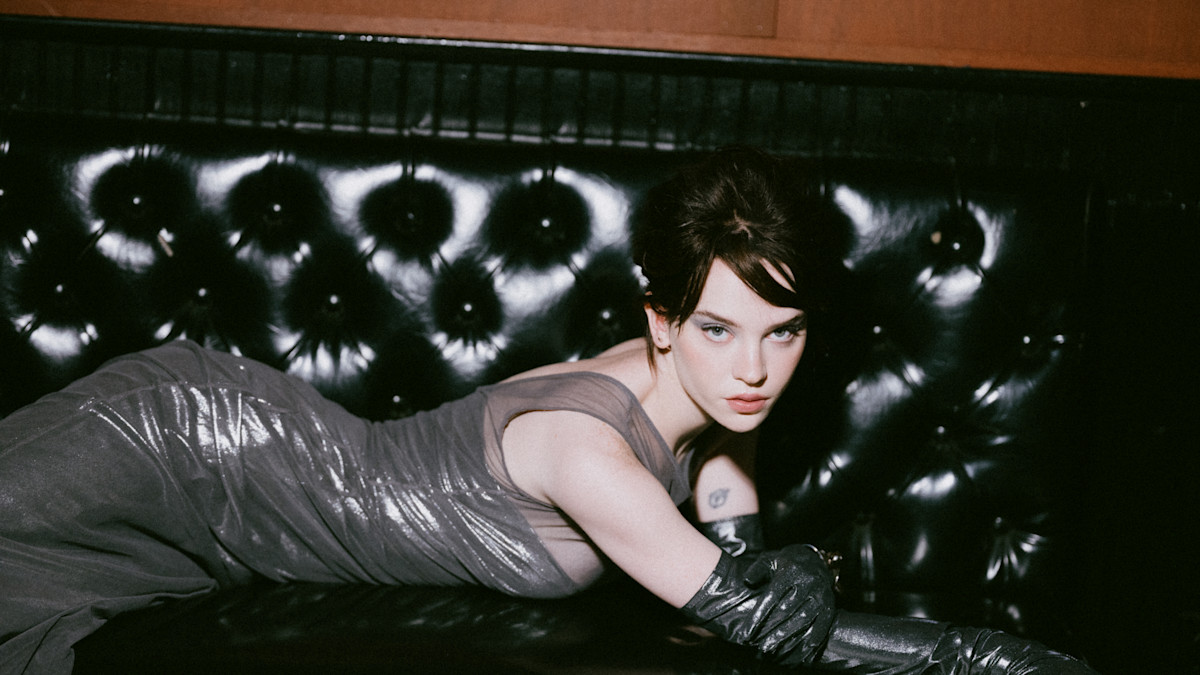
DRESS AND GLOVES, DOLCE + GABBANA.
TR: In 2018, you worked with Jay Duplass for the South by Southwest award-winning film Prospect. He's someone who has vast experience in front of and behind the camera. What did you learn from Jay about the business, about the work?
ST: He has a very collaborative approach, and that's what I want to take with me. I was recently talking to some people about this other show that I might do, and they were saying that they would want me to be a part of the entire creative process, to write and give my input. I think that's so important, and [Jay] showed me that, really early on. We were working with these two amazing directors, Zeke and Chris, but it was their first thing, so he was helping me out a lot. There was the idea that it's important to build a family. It's important to keep lightness on set. It's important to trust everyone, and to give your input. Jay Duplass does it all. I think a lot of actors are leaning towards this more now than ever. That feels like my own approach. And it's easier if you're an actor and you're also a writer, or you have to have a writer's sensibility. I had a hard time feeling like I wasn't an artist when I was growing up, because I was an actor. The more and more I do really serious shows and serious roles, the more I see the impact I can have. That makes me understand, 'No, that [mindset] is bullshit'.
"When I was doing this last season of Yellowjackets,..I couldn't really watch other TV shows. It makes things feel very tainted. I need to have such a one-track mind, and mentality."
TR: It's not surprising to me at all that you are being thought of for projects in this way, and it's so exciting.
ST: It's exciting because that's the dream. I feel like I want to be making my own movies by the time I'm 30. I would love to direct, I would love to make my own movies, and tell my own stories. Not yet though. [Laughs]. So much for me to learn on set still, and I want to attack it at the right time and when I'm at my most confident. I'm still learning so much right now.
"I had a hard time feeling like I wasn't an artist when I was growing up, because I was an actor. The more and more I do, really serious shows and serious roles, the more I see the impact I can have, it makes me understand, 'No, that mentality is bullshit'."
TR: Stephen King posted an incredibly complimentary tweet about Yellowjackets last year, and upcoming, you're starring in an adaptation of his The Boogeyman, a story line previously adapted for films like Black Swan and A Quiet Place. It's releasing on June 2nd.
ST: I'm really, really happy that it's getting a theatrical release, because it was originally supposed to just be on Hulu. I'm happy that horror is having a moment, and horror is being taken seriously.
TR: Do you love the horror film genre?
ST: I do, I do, and I don't want to be totally, you know, boxed into one category, but it's what I grew up with. There are so many things to play around with, within horror.
TR: What were the first horror films that influenced you?
ST: Definitely 28 Days Later. Love that movie. Pan's Labyrinth was a big movie for me. What I was saying earlier, about wanting to live in a fantasy world...Guillermo Del Toro does it so well, it felt like such a lived-in world. When I watched it really early on, it blew my mind. That's the fun thing about genre pieces. They're something that I don't get to experience while I'm here, but I get to experience in my fantasy world, when I'm on camera and hopefully, fully present. I'm very excited about Boogeyman going into the theaters and not just on your TV screen or phone screen, because you're actually forced to go on a journey with my character. I was really excited when I watched it. I think I'm getting better at watching myself and removing myself from my character, realizing that this character, is so not me. With Boogeyman, I was able to do that pretty quickly. It took about ten minutes of looking at the screen to be like, 'This isn't me'.
"I was recently talking to some people about this other show that I might do, and they were saying that they would want me to be a part of the entire creative process; to write, and give my input. I think that's so important, and [Jay Duplass] showed me that, really early on."
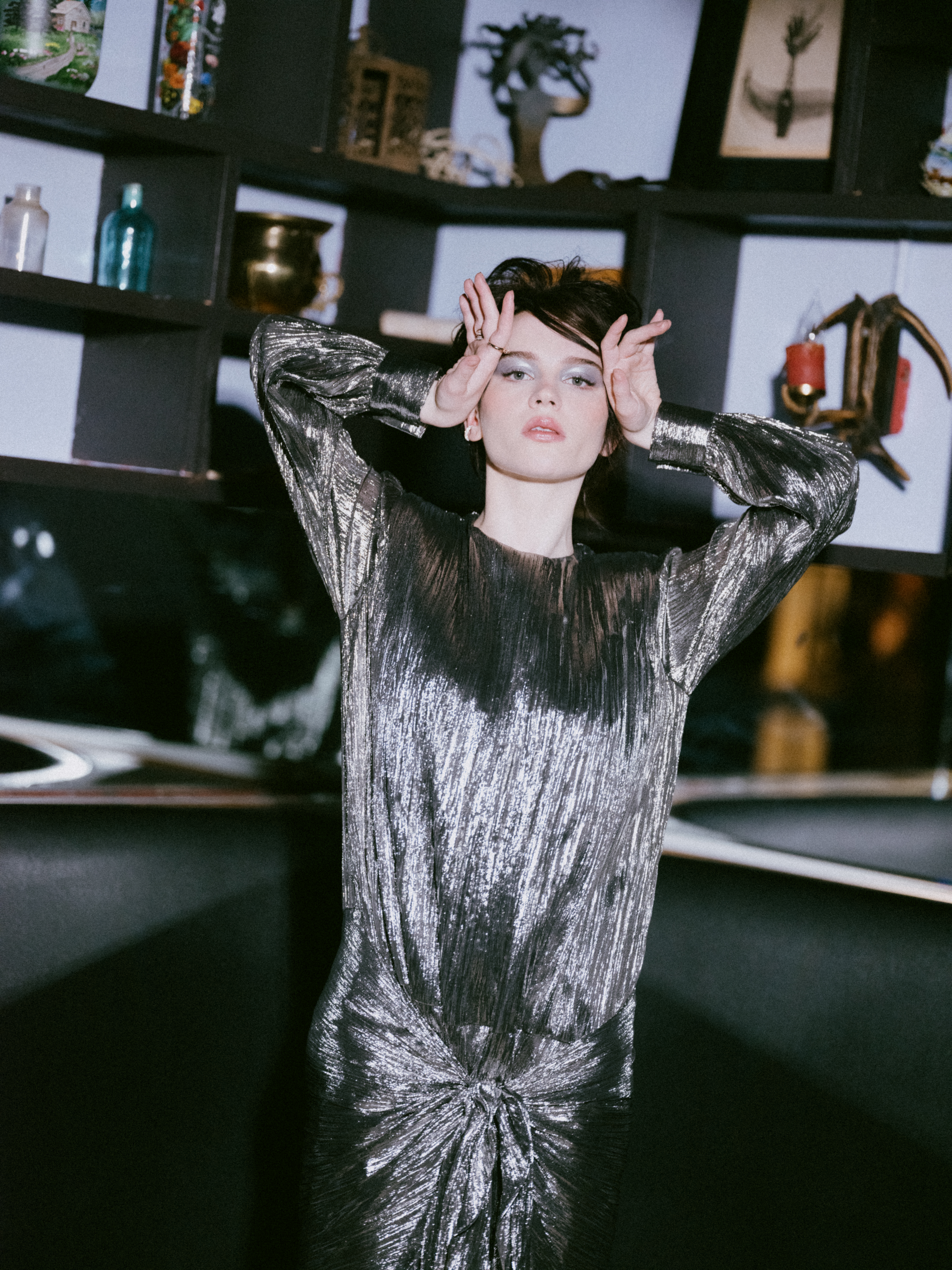 Dress, Gucci.
Dress, Gucci.
TR: Some actors are okay with viewing themselves on screen; others have a difficult relationship with it.
ST: It was bad for a while for me. It's like body dysmorphia...
TR: What did you love about working on The Boogeyman?
ST: At the core of the movie, it's about a family, it's about grief, and about how different people deal with grief in different ways. I was lucky enough to portray a character who has a really well-rounded arc. Watching it, you have a lot of empathy for my character. I felt so close to her. Living in that world for two months was fucking exhausting [laughs], and I wasn't expecting it to be that exhaustiing. It was fucking heavy, experiencing it; living in that world to my fullest potential; having people who were pushing me; having a director who really believed in me. We built a very strong foundation before going in, which is so nice to have. You don't really get that as much in TV because it's a faster process. We had a couple of meetings---myself, and [actor] Chris [Messina], and the director, and went through the script. We started improvising, we started building very specific moments, past memories---all that I think made for a fully lived-in world. It was a really tough experience, but after seeing it, I'm really proud.
TR: In Yellowjackets, of course you play Natalie alongside Juliette Lewis, who plays older Natalie, and you've collaborated closely with her for the role to build out the character in terms of her style, her interests, all the things. Did you get a chance to regroup with Juliette around who Nat is in season two?
"Playing a younger her has made me...more confident."
ST: Not really. We have so much trust in each other, so much trust that I think, to some extent, the trust speaks for itself. And sometimes it's better not to be overly self-aware, which I can lean towards. Sometimes knowing too much of what's going on with present day Natalie isn't going to help me, because that's the end result of Natalie. I get to fill in the blanks about what gets her there. That's exciting for me; it's an exciting job to have. It's a very rare opportunity, getting to see where your character ends up. Sometimes it's hard for me, watching the show, thinking that I'm not as intense as Juliette, that kind of thing. But my character has so many more years of turmoil and trauma and guilt ahead of her, that it makes sense that she's not there yet. There's a 20 year difference, and that's a long time.
TR: What do you think the value will be for you, in having collaborated so closely with a veteran actor like Juliette Lewis early on in your career? She's someone who is a distinct talent in TV and film, someone who has made a big mark with her artistic contribution. Do you ever think about what this experience might mean for you in the future, or how it might prepare you going forward?
ST: It's definitely given me confidence. It's given me the feeling that I can have artistic freedom. I don't have to just do one thing, and I don't have to be only an actor. Juliette does it all. To me, she's like a fucking performance artist. On stage, she goes to the other extent. It's so exciting to see that, and see how much respect people have for her. It makes you realize that you can be taken seriously as an artist, and not just as an actor. That was always kind of my concern, growing up around musicians and such, that I won't be taken seriously. Juliette has the confidence and artistic freedom to delve into music when she doesn't want to act. She can do anything. Playing a younger her has made me...more confident. I've forced myself, [laughs] forced myself, to be more spontaneous and less aware. It's an interesting place to be, playing side by side, playing this role. And then there's also that the role is being played by this iconic actor. It's such a mind fuck in a great way. Her voice is in my head as the character. Natalie is such a clearly drawn character because of her, because we have Juliette, and then I interpret her in my own way.
TR: This season, Yellowjackets becomes more intense. How did you get ready to work on season two? Is there anything you did to prepare yourself in advance, to go dark and go deep for the season's story lines?
ST: I was trying to not get myself in the same spot that I ended up in, last year. I was very focused on almost not bringing the character home too much. I wanted to remain healthy. I had a really bad and crazy scooter accident the day before I was supposed to leave for shooting, and that put me in a really dark place. I lost teeth and stuff. I was supposed to be in Vancouver, but I had just gone through something very traumatic and very random. That built some heaviness and grit in me that lived in my character, and stayed within me. Going into season two, I thought, I can't let this get too heavy, so I brought my boyfriend, and also I would travel back and forth, often. If I had two days off I would go to LA, because I was already living with so much heaviness.
"I had a really bad and crazy scooter accident the day before I was supposed to leave for shooting, and that put me in a really dark place. I lost teeth and stuff."
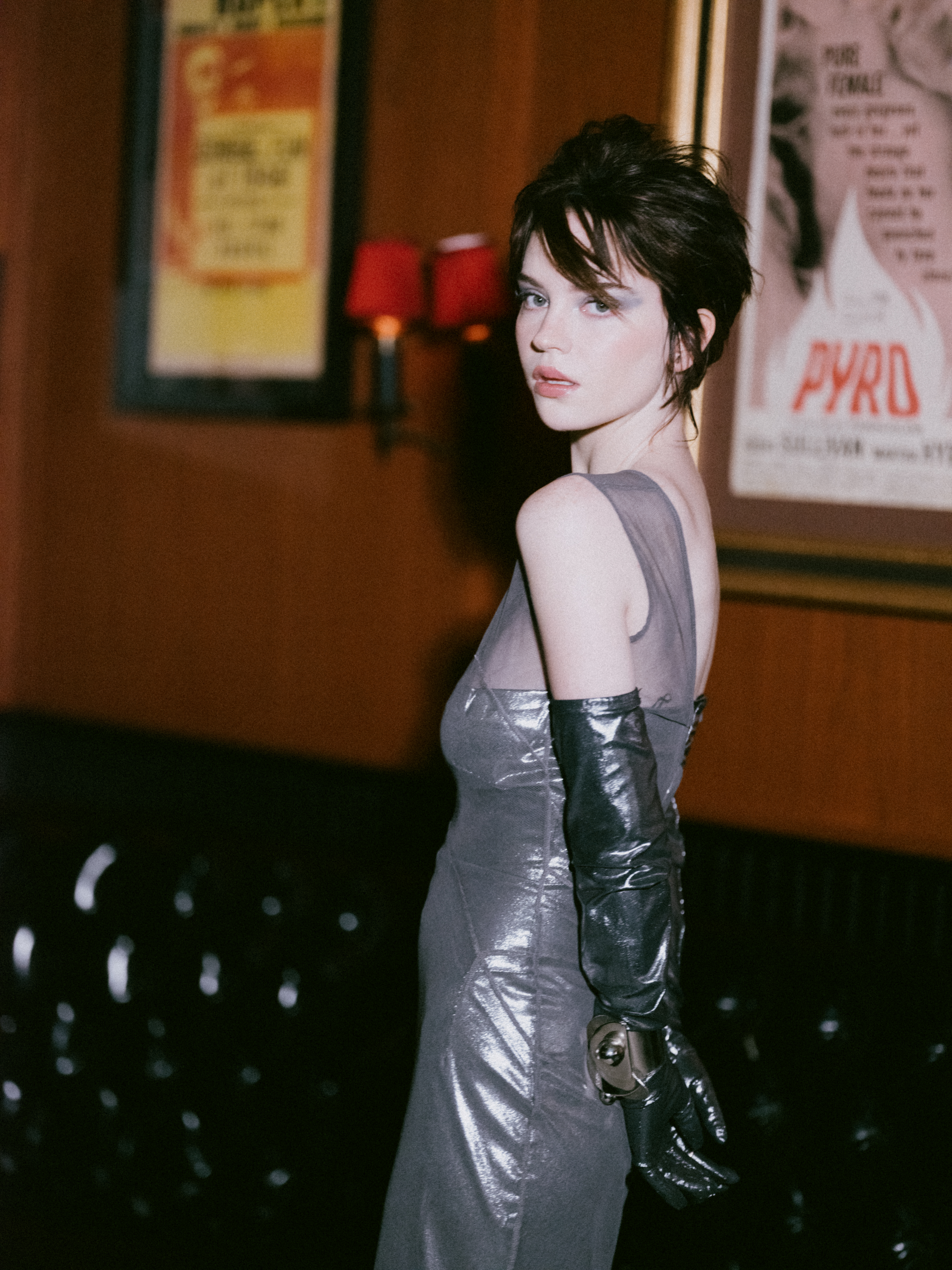 Dress and gloves, Dolce + Gabbana. Cuff, Alexis Bittar.
Dress and gloves, Dolce + Gabbana. Cuff, Alexis Bittar.
TR: Having just gone through a pretty jarring experience, you were going into this project where there's heavy material...
ST...Which is also jarring.
TR: How do you do the dance of both keeping Nat with you and letting her go, during the course of shooting a season? What happens in those in-between times in the shoot schedule?
ST: I'm just learning, which is funny, that I'm very sensitive to my physical environment. Vancouver to me is a great city, but sadly it's Yellowjackets, and it's hard to get out of that head space no matter what, no matter how hard you try. Home, for me, is with my boyfriend; it's with my twin; it's with my mom; it's with my sister. Early on, you learn to cultivate that, when you're working a lot and traveling a lot, and a lot of pressure is on you. I was lucky enough to find those things.
TR: The group's cannibalism is finally seen on screen this season, in a pivotal key group scene, but also in scenes with teen Shauna. How was that for you, before, during, and after?
ST: I loved the way it was introduced into the episode. I love how there's this crazy surrealist dream sequence. I viewed it as them trying to cope, them trying to escape. I love that the show is kind of going into the more obscure, the more outlandish, and the dream sequences. We're getting to go to places we haven't before. I love how it's such a huge moment. It went there! I was nervous because it was such a big moment. I know it from my friends, too, they all love the show, but everybody was like, 'When are you going to start showing it?' That's the big question of the series because it was set up so early in the pilot. When is it gonna happen? I think we've done such a good job in building up to this moment, so it feels justified. If it happened too early on, it wouldn't have felt justified. You wouldn't have the same connection to the characters. You wouldn't feel the empathy that you do for them. When I was reading it---and we make jokes on set--- it's not normalized, but it feels like you can't judge them. So much empathy has already been built up for our characters. They are in the worst possible situation. And once they get to this point, there's no going back. They've opened up a door, a door into the dark abyss, They have to live with the guilt, and that means that, basically, anything can happen now.
"Vancouver to me is a great city, but sadly it's Yellowjackets, and it's hard to get out of that head space no matter what, no matter how hard you try."
TR: What was the discussion like, around how each of you should perform in that scene, in eating a human body?
ST: It was definitely different for everybody, because each character is taking it on in their own way and also trying to justify it in their own way. What I was naturally feeling that day, on set? I was pretty disassociated. They did a very good job with replicating her body. It was great, and they did the best they could. I had a lot of, almost out-of-body moments, and panic moments. When that was happening, it played well with my character. I think Natalie would've turned to her numbness so she can survive. As I was doing that, as an actor. I was like, 'What the fuck am I doing with my job, with my life? What the fuck is this?!' [Laughs] I was feeling that naturally, so it played into everything. We all tried to remain light on set, but a lot of people were throwing up. It got weird that day. All of us were interpreting it, interpreting it as our characters---in different ways.
"I had a lot of, almost out-of-body moments, and panic moments. When that was happening, it played well with my character. I think Natalie would've turned to her numbness."
TR: I'd read that Natalie would maybe not be one who participates in the eating of Jackie's dead body. She's the skilled huntress of the group, and she's emotionally tough.
ST: I think it could have gone either way, but this season she's so focused on survival that she's losing a sense of herself. Her moral foreground is getting a little bit muddled. I think it does make sense for her to eat Jackie. She has to survive. That's her mindset this season. She's still the most grounded. She's facing reality every day. She's the one who's facing the practical issues, feeding everyone, physically going outside every day while everyone else is going to that other place, following Lottie. It's not exactly optimism, but she's giving them some kind of answer.
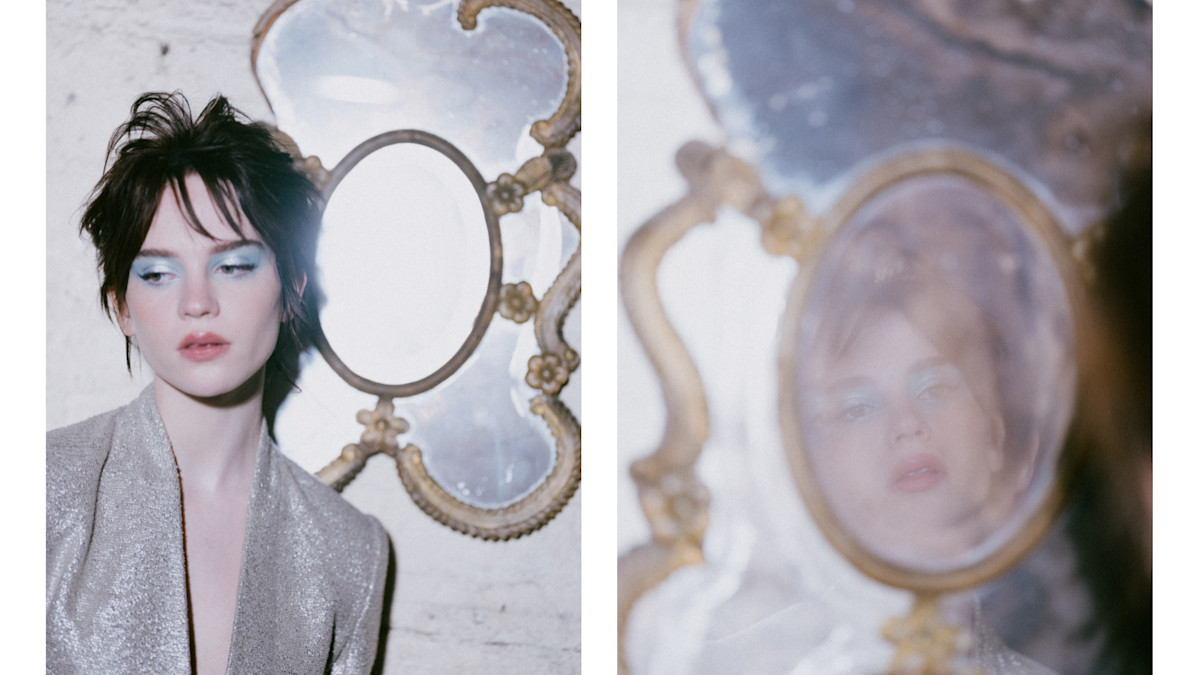
JACKET, ZIMMERMANN.
"I don't talk to my dad, so I completely understand it, and feel it in relationships."
TR: One of the things we also learn a lot more about this season, is Natalie's relationship with Travis. How do you describe their relationship this season, and how do you view their relationship in adulthood?
ST It's so toxic and it's so codependent. They originally bonded through trauma and through being outcasts. I don't think that would've happened if they were just in school together. They never would've crossed paths. This is a very strange, intimate experience. It's weird thinking about it. Natalie is someone who doesn't have a father, who never had any strong parental figure in her life. In her relationships, there's a heaviness, a more desperate desire to search for some kind of parental figure, some kind of guidance, some kind of...
TR: Anchor...
ST: Anchor, yes. It's a deep desire for her. I don't talk to my dad, so I completely understand it, and feel it, in relationships. They're so codependent, and they've seen each other at their worst. That's also their point of connection. They know that no one else will ever understand what they've been through, therefore no one else will ever have as deep of a connection as they do with one another---which is terrible. But sometimes that's how it is. It makes total sense to me. I would be the same as Natalie. I would be drawn to him. You just want your person, and like I said earlier, you just want to feel less alone. Natalie had a lot of loneliness, already instilled within her.
TR: Natalie does something to help Travis deal with his loss this season. Is that the height of their codependent relationship, is that when it's established, and fully takes root?
ST Definitely. It reaches a peak this season, and she carries a lot of guilt. In episode two, when she fakes Javi's death, I read it as, she's just looking out for him. I know that morally, a lot of people disagree with it, but immediately I thought, of course; she can't have Travis die searching for him, hour upon hour. Who knows what would happen? In her mind, what she did was what would save him. She knows it's wrong. There's so much guilt from her past, guilt from what happened with her dad. Even though it wasn't her fault, there's so much guilt in her already. There is so much guilt that continues building in later episodes, too, that makes it so much worse. [Laughs] So much worse...
TR: Would you have done the same thing, Sophie? 'Let me make this a little easier, for this person who I love.'
ST: I don't know, I think Natalie is a bit more resilient than I am. I want to take that quality from her. It is my favorite quality of hers. She's so focused on survival and has been her entire life. I don't think I have that in me. It's so hard to put myself in those specific shoes. But then also, selfishly, I'm always going take her side as an actor.
"There is so much guilt that continues building in later episodes, too, that makes it so much worse. So much worse..."
TR: Belief system emerges as a theme this season. There's the group, sometimes called a cult, that adult Lottie leads in her wellness center compound. And in order to create higher purpose and ritual while stranded, we also see the crash victims turn to a practice led by Lottie. The effects of trauma is a core theme in Yellowjackets, but how do you think the show is tackling the discussion around cults and spirituality and belief systems?
ST: The crash victims are coming from is a place of desperation, a place of feeling lost, and wanting to grasp onto something to find tangible answers. It's hard. People who are prone to falling into a cult---and I've been watching a lot of cult documentaries---come from a very lost place. They're seeking guidance. It's that idea of having somebody. It's the same with religion. It's the same with, like, giving purpose to everything. If there's not an afterlife, then what are we doing? It's trying to find a reason and a sense of purpose. Natalie talks about that, and I think all of them, to some extent, lost their sense of purpose after life in the wilderness, but Natalie does, especially. She had an important role there and she was keeping them all alive.
"I think all of them, to some extent, lost their sense of purpose after life in the wilderness, but Natalie does, especially."
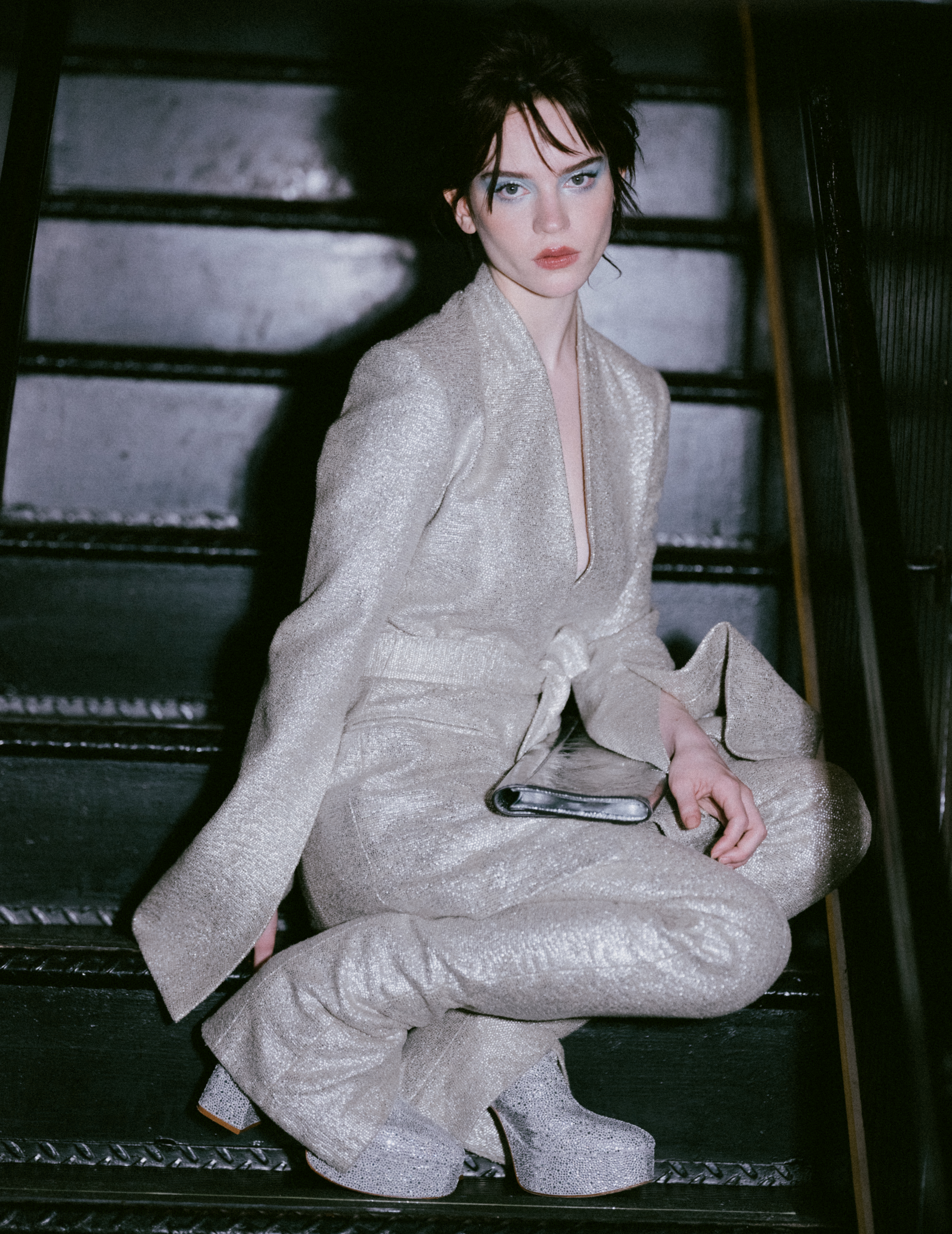 Jacket and pants, Zimmermann. Boots, Larroudé. Clutch, Alexis Bittar.
Jacket and pants, Zimmermann. Boots, Larroudé. Clutch, Alexis Bittar.
TR: From the perspective of someone who is Gen Z, how do you see 90s culture, and how do you feel about the 90s nostalgia we're seeing so much of right now? It's an integral part of the Yellowjackets story line, an integral to the look and feel. Do you think there's something special about the 90s, as an era?
ST: I think I'll always kind of glamorize it because I didn't live in it. I grew up with 90s music. I think there was an openness to the 90s era, and it also it seems to have felt a little bit more relaxed, less self aware. Today, we are very self aware to the extent that it can be dangerous, to the extent that it can taint you from being yourself fully, to the extent that it can hold you back in a lot of ways. And I think the 90s were just cooler because there wasn't social media.
"I think Natalie is a bit more resilient than I am. I want to take that quality from her."
TR:. After two seasons of playing a core character on an Emmy-nominated show, the most watched Showtime series of the last six years, how has it changed the way you understand what your strengths are as an actor, and how you want to navigate your career going forward?
ST: I love being able to be vulnerable on camera. That feels therapeutic to me. No matter what parts I take on, I want to be able to be as vulnerable as possible. And that's scary. It's weird to realize that everyone's seen me be vulnerable. People like to say that Natalie's a lot like me, and she kind of is, but she's definitely not, because we're live in different circumstances. I just want to go on to play vastly different characters. I want to play someone so far from who I am. My goal is to experience things I would never get to experience, in real life.

#BTS
APRIL 2023 COVER
SOPHIE THATCHER
LOCATION
NIAGARA | CABIN | 96 TEARS | LOVERS OF TODAY
NYC
EDITOR IN CHIEF
TAMARA RAPPA
PHOTOGRAPHER
KAT IRLIN
STYLIST
ANNA KATSANIS
MUSE
HAIR
PETER BUTLER
TRACEY MATTINGLY
MAKEUP
CAROLINA DALI
THE WALL GROUP
VIDEO
ANDREW DE FRANCESCO
PRODUCTION
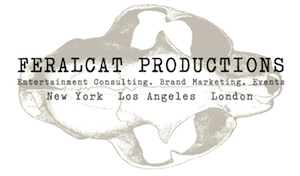
LIZ VAP
ASSISTANTS PHOTO: ROSHAKNIE HAYES | FASHION: PAULINA CASTRO OGANDO
"I have a synth that I really love, I have a Novation Summit synth. I make great ambient music. I would love to score something with it."
'I've been reading Sam Shepard: Seven Plays. He creates such lived-in characters within so many different archetypes, all played out realistically. "
"I've been playing Yasuaki Shimizu's Kakashi a lot. It's been great to paint to, and also space-out to."
"I've also been painting to Exuma's Life, he's from the 60s. Part McCartney covered one of his songs. He was very experimental, and ahead of his time."
"I've been wearing these vintage loafers for a pop of color, because I always wear black or brown."
"I just got a lot of free Dior makeup, and there's this Dior shine product, Dior Forever Couture Luminizer, that I've been putting in the corners of my eyes. It gives me that glow, and kind of opens up my face a little bit."
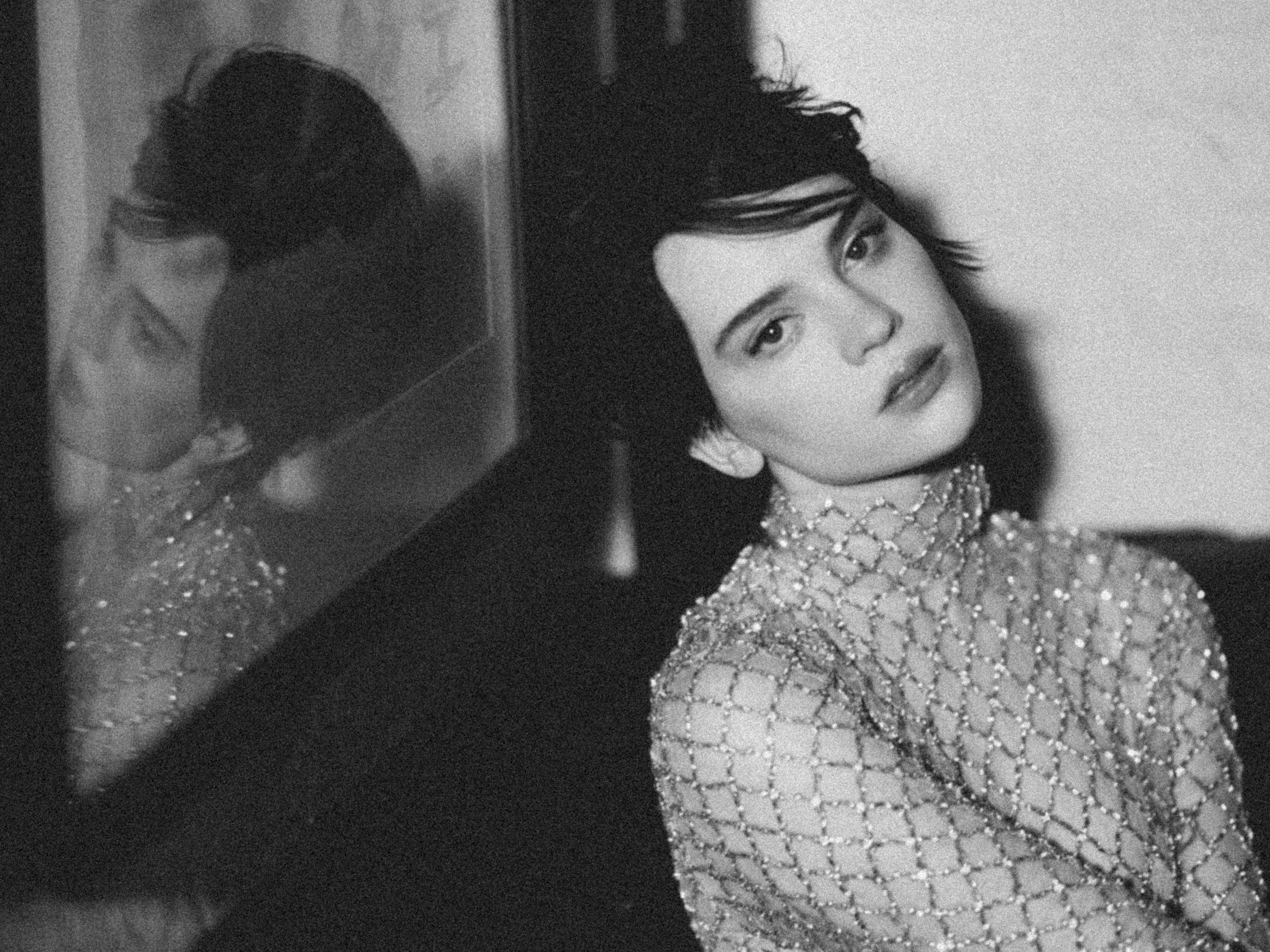
 Watch Sophie Thatcher as Natalie in two seasons of Showtime's Emmy-nominated hit series, Yellowjackets.
Watch Sophie Thatcher as Natalie in two seasons of Showtime's Emmy-nominated hit series, Yellowjackets.
